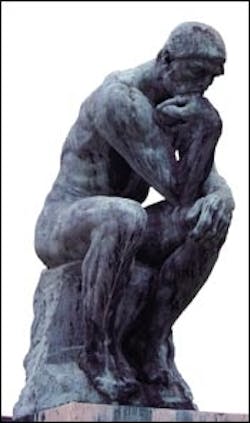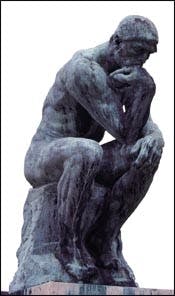Outcomes-based practice: The Wisdom of Solomon ...Part 7
by David W. Chambers, EdM, MBA, PhD
Photo: Pat Dallas @ FPG International
The Wisdom of Solomon consists of conducting customized experiments to discover the underlying structure of events. This is the essence of outcomes-based practice.
Practicing with the reflective apparatus in the "on" position is superior to going through the motions, hoping for something good. But reflection is different from the scientific method. Science applied to health care is only a few hundred years old and was necessary to establish the professional status of dentistry. It provides the indispensable background upon which practices are built. But science and the observations derived from it are for researchers; reflection in dental practice is for dentists. The two philosophies of dental practice could be called the Wisdom of Sherlock Holmes and the Wisdom of Solomon.
Observation ground in science — deductive reasoning from general truths — is what health-care professionals are taught in dental school and in scientific literature. It is the basis for diagnosis and related parts of dental practice. It is a matter of learning something in one context and applying it in another. This is the Wisdom of Sherlock Holmes.
Sir Arthur Conan Doyle, the creator of Sherlock Holmes, earned a medical degree in Edinburgh. Early in his career he was impressed with a professor named Joseph Bell. Bell could deduce the home region of a patient by the dust on his trousers, his recent past from the boots he wore, and his occupation by looking at his hands. The basic method is to correlate observations with an encyclopedic knowledge to draw scientific conclusions. Its epitome in dentistry is the differential diagnosis.
The basic assumption of continuing education and evidence-based dentistry is that augmenting the encyclopedic store of knowledge will automatically improve practice. Observation skills and deductive skills are assumed. Further, it is assumed that there is no variation from practice to practice (or from dentist to dentist) or that whatever differences might exist are unimportant. The Wisdom of Sherlock Holmes is the "wisdom of explicit knowing."
The Wisdom of Solomon is much older; it is the "wisdom of finding out." Solomon could not see into people's minds and hearts the same way Sherlock Holmes could. But he understood what their behavior meant. The famous biblical story of threatening to divide the baby is an example. Sherlock Holmes would have based his decision on tone of voice, known circumstances, historical patterns of mothering, and other available information. Solomon's wisdom was to create circumstances from which he could draw valid conclusions. He wanted to make a judgment (Goal); he created circumstances that challenged the two women to act (Experience); he observed their behavior (Assessment); and he rendered a judgment (Response). He reflected in practice rather than reflecting on practice.
Other stories show that the Wisdom of Solomon was a habit and not an isolated dramatic instance. For example, folklore says that the Queen of Sheba had cloven feet like an animal, which she always covered with her long skirts. To test this notion, Solomon installed a glass panel in the floor that resembled water. When the Queen approached him, she lifted her skirts instinctively, rather than get them wet.
Yet another story about the Wisdom of Solomon should be told in detail because of the profound lesson it contains about outcomes-based practice. This story comes from the Russian-Jewish tradition; the version I relate was recorded by Aleksandr Kuprin in his novella Sulamith.
A craftsman in gems went to the coast and found a precious stone, which he cut and polished and sent to his wife through a business acquaintance. When he finished his trip and arrived home, his wife said she had never received the stone. The merchant asked his acquaintance about the matter and was told that the pendant had indeed been delivered, suggesting that the wife had sold it and squandered the proceeds. He produced two witnesses who swore to this story. The merchant asked for a judgment from Solomon.
I have no idea what Sherlock Holmes would have been able to observe in this situation, but Solomon did not attempt to decide the case based on the evidence presented. He called for four clay tablets, which he gave to the merchant, the acquaintance, and the two witnesses. Each person was sequestered and instructed to draw a picture of the pendant on the clay tablet. When the tablets were compared, one witness had outlined a horse's head and the other drew the head of a sheep. Based on the similarity of the merchant's and his acquaintance's drawings and the dissimilarity of the other two, Solomon knew that the merchant and his wife were telling the truth. Solomon based his decisions on observing outcomes, not on prior knowledge.
The Wisdom of Solomon consists of conducting customized experiments to discover the underlying structure of events. This is the essence of outcomes-based practice. Knowledge is not imported and warehoused in case it might prove useful; it is created in the context where it needs to be used. Remember this story and its moral: Those things that are similar when manipulated can be understood; those things that behave unpredictably are hard to understand.
The next four articles will show how the Wisdom of Solomon can be applied in practice. Two of the articles are about searching for the components and factors that matter most. Solomon was smart enough not to waste his time on the details, and no dentist should do that, either — regardless of how precise the methods of investigation might be. The next two articles are about switching components and factors in practice to obtain a better result.
The switching logic is Solomon's. The intent is to produce something of value — not to study it. Factors are abstract characteristics such as setting time or front-desk personality. Components are prepackaged sets of factors, impression material A, or Stephanie. It makes a lot of difference whether dentists are thinking about components or factors.
As an aside, the story about the merchant and the golden pendant illustrates the statistical principal of variance analysis. The ratio of the differences resulting from an anticipated effect divided by the differences that occur in the natural world is a powerful tool of modern statistics. It was "discovered" in the first third of the 20th century by the Englishman Sir Ronald Fisher, almost three thousand years after we had forgotten the Wisdom of Solomon.

